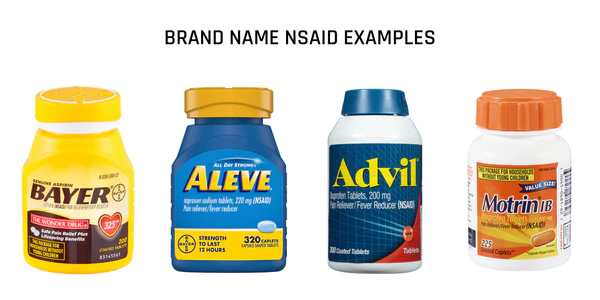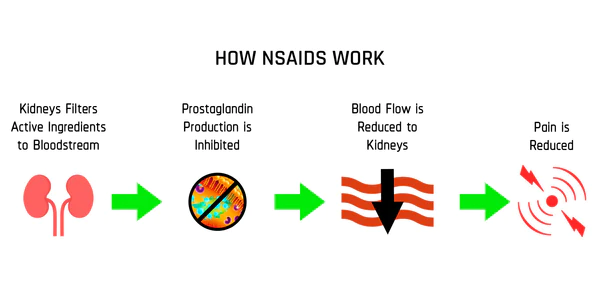NSAIDs (non-steroidal anti-inflammatory drugs like aspirin, Ibuprofen, Advil, Motrin, and Aleve) are widely prescribed and in use by people suffering from kidney stones. While NSAIDs are perceived to be safe and offer easy access, low cost, and moderate pain relief, there are downsides to use of this drug that need to be taken into consideration
WHAT ARE NSAID’S?
NSAID is an abbreviation for Non-Steroidal Anti-Inflammatory Drugs. In essence, this classification does not use steroids (aka synthetic hormones) to lower inflammation (anti-inflammatory). NSAID’s are widely prescribed and used to treat:
- Inflammation (such as arthritis)
- Mild to Moderate Pain (such as headaches, cramps, or muscle pain)
- Fever
Listed below are a few of the brands that you might encounter at the pharmacy or grocery store that are classified as NSAIDs:
- Aspirin (Made by several companies)
- Ibuprofen (Motrin®, Advil®, Motrin IB®)
- Naproxen (Naprosyn®, Aleve®)
- Nabumetone (Relafen®)

HOW NSAID’S WORK
The actual biochemistry behind the mechanism by which NSAIDs function is exceptionally complicated. However, we’ve done our best to simplify the mechanism to help increase understanding of what’s happening in our body when we ingest an NSAID.
- NSAID is ingested and metabolized.
- Kidneys filter active ingredients in NSAID into the bloodstream.
- Active ingredients in NSAID block Prostaglandin production by inhibiting Arachidonic Acid
- Prostaglandin: local hormones that manage inflammation and vasodilation (expanding/contracting of blood vessels)
- Arachidonic Acid: Omega 6 Essential Fatty Acid
- Inhibition of Prostaglandin production leads to reduction in blow flow which leads to decrease in pain.
Think back to the last time you took an NSAID for a headache. If you really give it some thought, you’ll be able to identify the perceptible decrease in pain/pressure in your head as blood flow is restricted by the NSAID. Pretty cool stuff!

PROBLEMS WITH NSAID’S
While NSAIDs are generally regarded as safe and widely available, there are problems that can/will occur even after just a few days of taking them. One of the biggest things that jumped out to us was that 20% of people who take an NSAID will experience renal functional abnormalities such as:
- Fluid & Electrolyte Disturbances: sodium retention (edema, hypertension), hyponatremia (reduction of renal free water clearance)
- Acute Deterioration of Renal Function: reduction in the kidney’s ability to filter waste and water from blood
- Nephrotic Syndrome with Interstitial Nephritis: too much protein in the urine with inflammation in the space between kidney tubules which decreases filtration
- Papillary Necrosis: death to the openings of the collecting ducts in the kidney where urine flows to the ureter
- Renal Failure: kidneys can no longer filter waste and water from blood
Fortunately, these issues are reversible once you stop taking an NSAID. However, it’s not a few days or a few weeks until things return to normal. It can be months upon months of recovery.
NSAID ALTERNATIVES
When you subtract NSAIDs from the equation, the options for kidney stone pain management are pretty simple. Your options are either Acetominophen (Tylenol), Opiates/Opioids, or natural pain relievers.
One safe and natural solution we can suggest is our product, CLEANSE. Aside from helping manage the discomfort and agony, CLEANSE can help you pass your kidney stone faster too.
REFERENCES
- Nonsteroidal anti-inflammatory drugs: effects on kidney function
- Significant Acute Kidney Injury Due to Non-steroidal Anti-inflammatory Drugs: Inpatient Setting
- Is Ibuprofen Bad for Your Liver and Kidneys?
- NSAIDs in CKD: Are They Safe?
- NSAIDs and Acute Kidney Injury
- Do NSAIDs Cause Kidney Injury?
- Nonsteroidal Anti-inflammatory Drugs (NSAIDs)


Responses